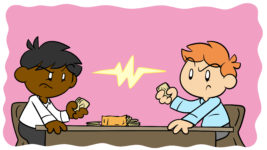Getting a short story published is fantastic for an author, whether it’s an end in itself or a way to increase visibility and reputation. It can also be incredibly difficult, especially for those just starting out on their journey to publication.
In fact, there are a lot of issues faced by first-timers and experienced short fiction authors alike that have easy, but little known, solutions. That’s why, in this article, I’ll be sharing 10 things you should do to give your short story the best chance of publication.
#1 Decide what you want
Do you want acclaim, money, or visibility? Of course, in an ideal world you’d get all three, but when you start out trying to get a short story published it’s important to focus on one.
Why?
Because there are a lot of places that publish short stories, and you need to be pursuing those which suit your goals best. If it’s important to you to be paid for your work then anthologies and competitions are the way to go. If you value acclaim more than a fee, then it’s better to look at publications with a high reader base or some awards under their belts. If visibility is what you’re after, then focusing on online publishers or writing websites may be preferable.
That’s not to say that you need to throw secondary motivations aside, just that getting a short story to publication is a long and difficult process; the more focused your efforts the better.
Publishing a short story is a long, difficult process; the more focused your efforts the better.Click To Tweet#2 Assume it will take more than one try
Approaching any kind of publisher is a case of hoping for the best but being prepared for the worst. This means that you should manage your expectations – not getting discouraged by rejections is important – but it also means that it’s important to write for publication rather than to write for a particular publisher.
Most anthologies, and some competitions, are likely to have themes or subjects. This means the pool of entrants will be smaller, but there’s a good reason for that; if they turn down a themed entry then it’s going to be difficult to use that short story elsewhere. Because of this, you need to know your plan B before you get involved with a themed publication. Is the story you’d write the kind a non-themed publication would accept, or could it be adjusted along those lines if necessary? If not it’s best to avoid this kind of publisher until you have some experience in what it takes to get a short story published.
This advice isn’t restricted to themes; you also need to consider word count and tone. A longer word count, or the inclusion of adult themes and language, will limit your options if your first choice of publisher doesn’t accept your entry. Even the choice between writing a five thousand or three thousand word story can significantly alter your options.
Of course the only way to make sensible choices is to have an accurate overview of the market.
#3 Research the market
This shouldn’t take up too much of your time, a few earnest sessions with Google will do it, but it’s important to understand the dominant trends in the short story market. As I mentioned above, far more publications are interested in three thousand word stories than in five thousand word stories, however the market also tends towards higher prize money or acclaim for longer stories (hence needing to decide what you want).
Researching will also help you learn some of the signs of respectability and acclaim for various publications, and gauge which would be suitable for the type of story you write. For example prize money is often a less reliable indicator of acclaim than a professional-looking website.
#4 Write more than one story
Not only does this help your chances and put you in the right mind-set, but it keeps you working towards publication. You write a story, you submit it for publication, and then there’s a huge expanse of dead time before the response. One of the worst uses of that time is to worry and fret about the result; it’s a waste of time, and it makes rejections all the more crushing.
Instead always be writing, proofing, or submitting a story for publication. This doesn’t mean you should rush through one step to get to the next, just that once you know there’s nothing more you can do on one story, it’s time to do something else. Not only will this help you hone your art, it will also temper the impact of any setbacks. One story may not be doing as well as you like, but you’re already working on the next.
Always be writing, proofing, or submitting a story for publication.Click To TweetIn a very short amount of time this will establish a stable of short fiction from which you can draw. This embodies hoping for the best and preparing for the worst, as it sets up writing behavior and tools that will support a sustained period of effort.
#5 Proofread thoroughly, then proofread again
The tolerance for error in short stories is even less than for longer fiction; not only is there less for you to proof, but anyone collecting short fiction for publication is drowning in applications. A missed error is not just taken as a lack of professionalism, but as an indication that you don’t understand – or worse, don’t respect – the environment in which you’re hoping to succeed.
Proof until you’re sure then proof again. Have someone else take a look, then someone else, then take another shot at proofing it yourself and despair when you find an error. Work under the belief that whoever reads your work will discard it at the first typo and you won’t go far wrong.
Don’t forget formatting or file type. One magazine might request certain margins for easy notation, while an anthology needs all its entries to be .doc to save time in compilation. They’re easy things to get right, which makes it look that much worse when you fail to do so.
#6 Research individual publications
Different publications have different rules, and different tones. You need to read at least one issue of any magazine you’re submitting to, and look into the work of previous winners and contributors of any anthologies or competitions you enter. This is doubly the case if you’re writing for a particular publication or competition (with, of course, a view to adjusting the work if you’re unsuccessful.)
It’s vitally important to take this stage of research seriously, in fact I’d advise writing out the rules and guidelines to cement them in your mind. All it takes is one half-remembered detail and you’ll end up with a story that needs to be butchered to make it eligible. Make sure your reading is thorough; many publications include low-key instructions to weed out time wasters – some even ask you to include keywords in email headings as proof you’ve read everything.
#7 Approach multiple publications at once
This is easier to do when you’ve got a few short stories to choose from, but is good practice from the beginning. Waiting on multiple replies stops you from placing too much importance on one, and with the response speed of most publications (think seasons, not months) it’s a necessity for those serious about getting published.
Of course if two publications accept the same piece you might have an awkward email to send, but better that than a maximum of four or five entries in a year.
#8 Track your submissions
A basic spreadsheet is all you need, but it’ll save hassle down the line. As well as putting you in a professional frame of mind it provides an easy reference if you’re waiting for multiple responses, and can be used to plan ahead for upcoming projects.
#9 Write a (relevant) cover letter
Most publication guidelines will include the necessary details for your cover letter. These will usually include a brief synopsis of your story (roughly three or four sentences is the norm), a short and humble author biography, and an introduction specifically tailored to the recipient. If possible, and it should be, include details about the publication you’re contacting; past issues you’ve enjoyed, or authors of their acquaintance who you respect.
There are short story writers who blindly send their work to any competition or publication going, and editors know it. Because of this the more bespoke your enquiry, the more well-disposed the recipient will be to your work.
#10 Don’t give up
It’s difficult to communicate how busy most short story publishers are, whatever their chosen format may be. Rejection could be down to quality or suitability, but it could also be because someone rushed through your entry to get to lunch or your heroine shared her named with their ex-girlfriend. Obsessing over the whys gets you nothing, wears you down, and wastes your time.
Obsessing over why you don't get published gets you nothing, wears you down, and wastes your time.Click To TweetIf feedback is provided then take what’s useful and move on. If not then that’s fine; you’re waiting for two more responses for the same story, and are busy writing the next. Writing and applying for publication isn’t a series of ‘success or failure’ moments, it’s one long process that constantly improves your flexibility and skill as a writer. It’s also a hell of a motivator, something we can all use from time to time.
If you’re serious about getting your short fiction published then take a look at 7 (free) online writing tools that will make you more productive for the kit you need to optimize your writing time. Or for more on writing for publication check out Should you enter a writing competition?
Fancy boasting about your successes, or sharing some advice from the short fiction trenches? Please get in touch with me in the comments below.
10 Things You Must Do To Get A Short Story PublishedClick To Tweet





9 thoughts on “10 Things You Must Do To Get A Short Story Published”
I wish in Italy we could have as many competitions as in the countries…
Hi boostwriter,
It’s probably worth checking out competitions in other countries as well. A lot of sites accept submissions from anywhere in the world.
Best,
Rob
I am a retired english teacher who has published one novel. I am considering writing articles or short stories. I have looked into blog writing and other stories for magazines.I can’t decide if blog writing is going to help me get read. My main concern is getting my writing read.I know I am starting out in a new career. Can you email me which direction I should go?
Hi Mike,
It really depends who you’re trying to reach with your work. I’d suggest looking at some competitions, as this is a good way to start finding readers.
Best,
Rob
Hello. I wrote a short story for the purpose of teaching my students figurative language. I do not tell my students that I wrote it in order to avoid bias feedback. For years, most of my students have loved the story. I also have graphic organizers and other teaching material that I created to accompany the story. I have a copyright on the work, but how do I move it to the place of publication? Thank you for your response.
Sincerely,
Mike
Hi Mike,
It sounds like you have almost everything you need to publish. The article below should help you decide on the right avenue for your project.
//www.standoutbooks.com/traditional-self-publishing-vanity/
Best,
Rob
Thank you for sharing such interesting tips. I think that short stories can help a novice writer gain an audience, because short stories can be written very quickly, and touch on various niches in writing. What do you think about this?
Hi Writer,
In short, I think you’re absolutely right. Short stories are an amazing tool in pretty much any arena – they help you improve your writing craft, you can use them to teach yourself how to edit, they give you things to publish, and they teach you how to be less precious about your work. They also let you explore ideas, plots, characters, and themes with relative freedom, and they’re the most realistic way for modern writers to try and ‘write every day’ without it becoming a crushing chore.
One thing that really brought my own self-editing on was writing shorter fiction to an exact word count. Having that kind of absolute goal in place really helps you separate writer-brain from editor-brain. A lot less ‘does anything really need to be cut here?’ and a lot more ‘what can I shave away to hit my goal?’
Best,
Rob
Hi,
I am writing a short story with my grandson. What is the best avenue to digitally self publish this? Thanks!